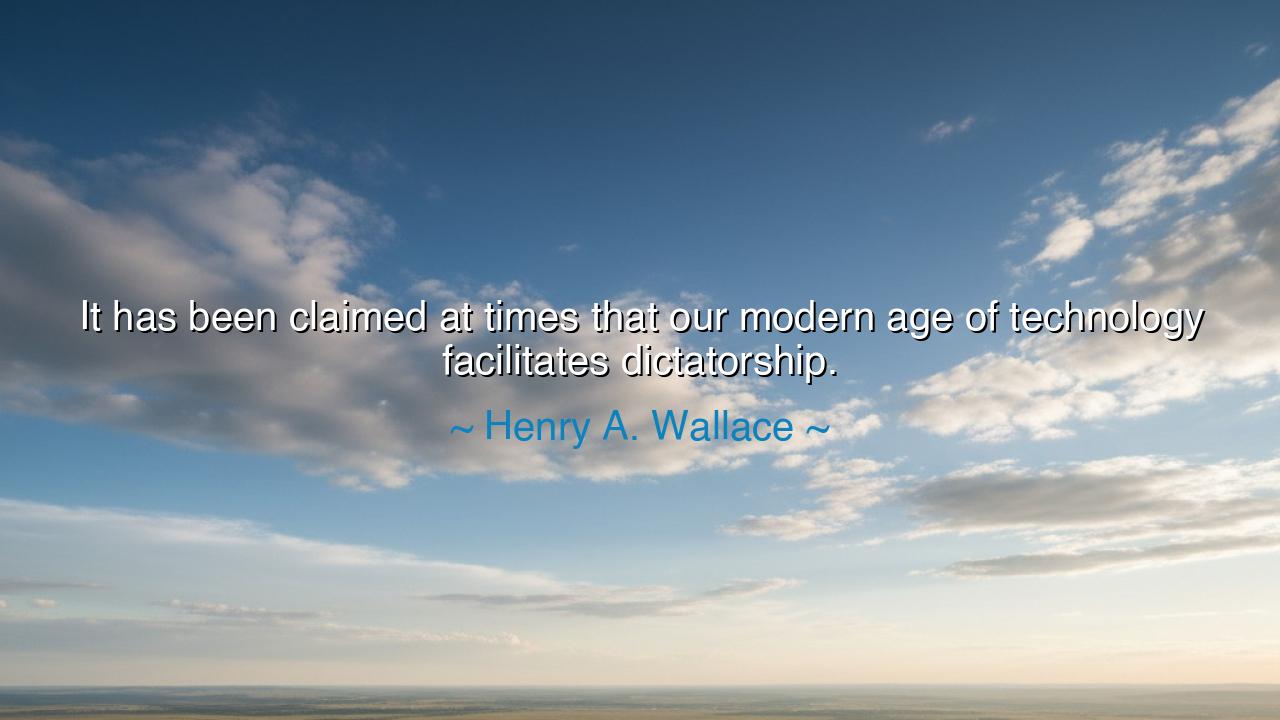
It has been claimed at times that our modern age of technology
It has been claimed at times that our modern age of technology facilitates dictatorship.






In the vast and unfolding journey of human history, where the march of progress and technology has both illuminated and darkened the paths we walk, Henry A. Wallace offers a profound warning: "It has been claimed at times that our modern age of technology facilitates dictatorship." These words strike at the heart of a great tension in human affairs: while technology has the power to liberate, it also has the potential to enslave. In the age of mass communication, surveillance, and instant information, there lies a dangerous potential for those in power to wield these tools to suppress freedom and impose control. Wallace’s insight speaks not just to the advancements of his time but to a timeless truth—that every tool we create holds within it the seeds of both greatness and tyranny.
In the ancient world, the rise of powerful empires also showed us the dual-edged nature of technological and organizational advancement. The Romans, whose engineering feats were unparalleled, created roads, aqueducts, and military technologies that allowed them to control vast swaths of territory. Yet, their achievements in infrastructure were also used to solidify imperial control, ensuring that Caesar could extend his reach and influence over an expanding empire. The power of Roman technology, from its military innovations to its administrative structures, became a mechanism of domination, allowing rulers to impose their will with precision and reach. The lessons of the Roman Empire serve as a reminder that technology, in all its forms, can be used not only to build but to conquer, often with little regard for the freedom of those it touches.
Consider the rise of dictatorships in the 20th century, where technology played a critical role in consolidating and maintaining power. The infamous figure of Adolf Hitler used the power of radio and film to project his message of hatred and control across a nation, ensuring that his ideology reached every home and every mind. His oratory, amplified by modern media, allowed him to manipulate the masses with precision. In this age of mass communication, where technology could unite or divide, Hitler understood its power as a means of creating control. His rise to power was facilitated by the very tools that should have been used to promote free exchange of ideas. Wallace’s warning that technology could aid in the rise of dictatorship was tragically fulfilled in the horrors of the Nazi regime.
This tension between freedom and control in the modern age is not confined to historical tyrants, but exists in every age where power is exercised over the many by the few. In the current age, the growth of surveillance technologies, social media, and data analytics has brought forth the potential for even the most democratic societies to slip into the hands of authoritarianism. Governments and corporations alike now have access to vast amounts of personal data, allowing them to manipulate behavior, control opinions, and track movements. What once seemed like the height of democratic participation—where the individual could broadcast their ideas and participate in the digital space—has, in many ways, become a tool for control. These technologies, once heralded as liberating, now carry the very real danger of becoming the chains that bind us.
In contrast, ancient philosophers like Socrates and Plato were deeply aware of the potential for power to corrupt. Plato, in his "Republic," warned of the dangers of unchecked authority, where those in power could use their influence to manipulate the masses for their own ends. His solution was to create a philosopher-king, a ruler who would be guided by wisdom and virtue rather than the temptations of tyranny. But even Plato understood that such power must be watched closely, for the capacity for abuse is ever present. In this sense, Wallace's words resonate deeply with Plato's warnings: technology, like the power of the king, can be used for good or for evil, depending on who holds the reins.
The lesson here is clear and urgent: we must guard against the corrupting power of technology, understanding that it is a tool, neither good nor evil in itself, but shaped by the hands that wield it. Technology can be a force for freedom, progress, and empowerment, but when placed in the wrong hands, it can just as easily be used to subjugate and control. Just as the Romans and Nazis used their technological advancements for domination, so too must we be vigilant in our use of the tools we create. Democracy, at its core, is about the protection of freedom—and we must ensure that our advancements in communication, surveillance, and data do not erode that fundamental freedom.
Practical action calls us to embrace responsibility in the face of technological progress. It is not enough to simply marvel at the wonders of technology; we must ensure that these tools are used to enhance, not limit, human liberty. As individuals, we must remain aware of how our data is being used and seek to protect our privacy and freedom. As citizens, we must hold our leaders accountable and demand transparency in how technologies are deployed, ensuring that they are used for the public good, not for the consolidation of power. As Guardians of our own democracy, we must remain ever-vigilant against the subtle encroachments of tyranny in the digital age, and use the gifts of technology to empower, not control. In this way, we honor the hard-won freedoms of the past and protect them for the generations to come.






AAdministratorAdministrator
Welcome, honored guests. Please leave a comment, we will respond soon